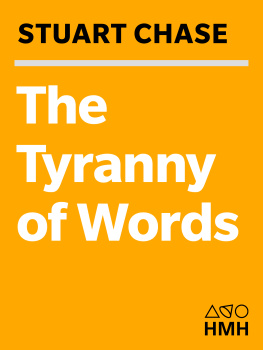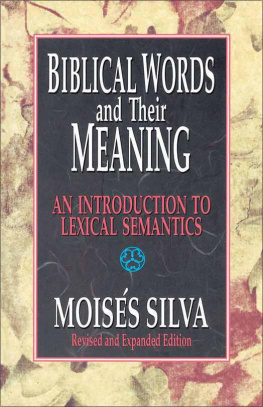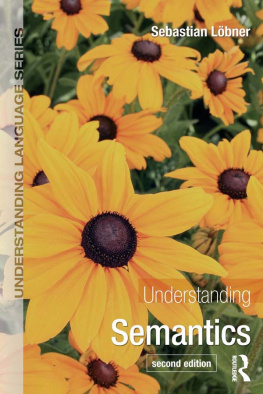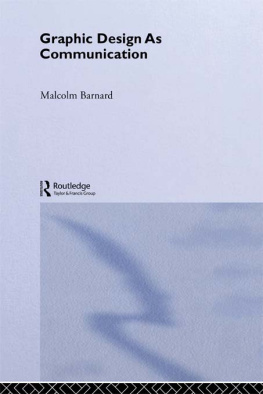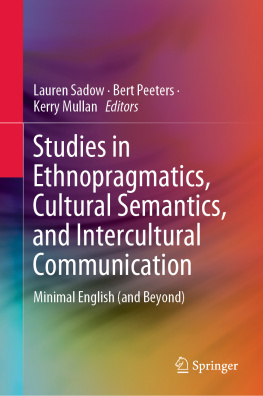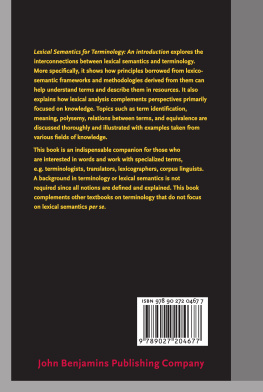Stuart Chase - Tyranny of Words
Here you can read online Stuart Chase - Tyranny of Words full text of the book (entire story) in english for free. Download pdf and epub, get meaning, cover and reviews about this ebook. year: 2015, publisher: Mariner Books;Houghton Mifflin Harcourt, genre: Romance novel. Description of the work, (preface) as well as reviews are available. Best literature library LitArk.com created for fans of good reading and offers a wide selection of genres:
Romance novel
Science fiction
Adventure
Detective
Science
History
Home and family
Prose
Art
Politics
Computer
Non-fiction
Religion
Business
Children
Humor
Choose a favorite category and find really read worthwhile books. Enjoy immersion in the world of imagination, feel the emotions of the characters or learn something new for yourself, make an fascinating discovery.
- Book:Tyranny of Words
- Author:
- Publisher:Mariner Books;Houghton Mifflin Harcourt
- Genre:
- Year:2015
- Rating:4 / 5
- Favourites:Add to favourites
- Your mark:
- 80
- 1
- 2
- 3
- 4
- 5
Tyranny of Words: summary, description and annotation
We offer to read an annotation, description, summary or preface (depends on what the author of the book "Tyranny of Words" wrote himself). If you haven't found the necessary information about the book — write in the comments, we will try to find it.
Abstract: A popular approach to semantics in which the author discussess how to clarify the meaning of words and achieve more exact communication. Index
Tyranny of Words — read online for free the complete book (whole text) full work
Below is the text of the book, divided by pages. System saving the place of the last page read, allows you to conveniently read the book "Tyranny of Words" online for free, without having to search again every time where you left off. Put a bookmark, and you can go to the page where you finished reading at any time.
Font size:
Interval:
Bookmark:
Copyright1938, 1966 by Stuart Chase
All rights reserved. No part of this publication may be reproduced or transmitted in any form or by any means, electronic or mechanical, including photocopy recording or any information storage and retrieval system, without permission in writing from the publisher.
For information about permission to reproduce selections from this book, write to Permissions, Houghton Mifflin Harcourt Publishing Company, 215 Park Avenue South, New York, New York 10003.
www.hmhco.com
Library of Congress Cataloging-in-Publication Data is available.
e ISBN 978-0-544-66443-2
v1.0315
THIS book is an experiment. Is it possible to explain words with words? Can some of the reasons why it is so difficult for us to communicate with one another by means of language be set forth in that same faulty medium? It is for the reader to judge.
I have read a few books which have broadened my understanding of the world in which I live. These contributions I here attempt to pass on. To them I have added much illustrative material and a few conclusions of my own. The subject dealt withhuman communicationhas worried me for many years. I believe it worries every person who thinks about language at all. Does B know what A is talking about? Does A himself know clearly what he is talking about? How often do minds meet; how often do they completely miss each other? How many of the worlds misfortunes are due to such misses?
As a result of this uneasiness I long ago formulated a few rules which I tried to follow in my writing and talking. They were on the edge of the subject which concerns us in this book. In due time I found certain men who had penetrated boldly into the heart of the subject, equipped with tools of analysis more sharp than any I had used. I follow behind them here. I do not tell all that they tell, because I do not understand all that they tell. So this is not a full and careful account of the findings of other explorers into the jungle of words, but only an account of what I found personally illuminating and helpful. To Alfred Korzybski, C. K. Ogden, I. A. Richards, and P. W. Bridgman I tender my profound gratitude for the help they have extended, and ask their indulgence for what I have left unsaid. To E. T. Bell, Lancelot Hogben, Thurman W. Arnold, E. S. Robinson, Jerome Frank, Walton Hamilton, Henshaw Ward, and others quoted in the text I am only less indebted.
The manuscript has been read and criticized in whole or in part by Walter N. Polakov, John and Frances Gunther, Dr. and Mrs. Hugh H. Darby, Bassett Jones, Raymond Gram Swing, and Morris Ernst. My debt to them is great. H. M. Feine and Beverly Magee typed the entire manuscript twice and contributed various valuable suggestions. My son, Robert Hatfield Chase, consented to act the part of guinea pig, marking in green pencil those portions of the manuscript not clear to him, a boy of twenty-one. This was done on the perhaps not unwarranted assumption that if a Harvard undergraduate could understand the text, any intelligent reader could understand it. He proved a fine, conscientious guinea pig and I am grateful to him. My wife, Marian Tyler Chase, has given unsparingly of her time and critical intelligence in reading, revising, and documenting the manuscript. My gratitude to her is greatest of all. Mr. Hobie Baker, my yellow tomcat, has been most amiable in allowing himself and his affairs to be inquired into during the course of this study. As you will see, he comes close to being the hero of the story.
Finally, I should like emphatically to point out that the semantic discipline as set forth in these pages is concerned primarily with objective relationships between the individual and the outside world, between the me and the beyond-me. Into those subjective relationships inside the me, the psychological domain of motives, association paths, complexes, fixations, and the rest, I have not seriously ventured. I do not know enough. The field of semantics, broadly interpreted, includes this area. Subjective relations affect many of the problems which I have here considered from the point of view of communication. I urge more competent students to extend and make lucid the analysis in this field, an analysis which I can only indicate.
Stuart Chase
Redding, Connecticut
September, 1937.
Chapter I
I HAVE written several books and many articles, but only lately have I begun to inquire into the nature of the tools I use. This is a curious oversight when one stops to consider it. Carpenters, masons, and engineers who give no thought to their tools and instruments are not likely to erect very durable structures. Yet I follow a procedure common to most writers, for few of us look to our tools. We sometimes study synonyms, derivations, rhythm, style, but we rarely explore the nature of words themselves. We do not inquire if they are adequate instruments for building a durable structure of human communication. Language, whether English, French, or Chinese, is taken for granted, a basic datum. Writers search their memories for a better word to use in a given context but are no more in the habit of questioning language than of questioning the weather. There it is. We assume that we know exactly what we mean, and that readers who do not understand us should polish their wits.
Years ago I read a little book Dy Allen Upward called The New Word. It was an attempt to get at the meaning of idealism as used in the terms of the Nobel Prize awardan award for the most distinguished work of an idealist tendency. Upward began his questwhich was ultimately to lead him over the living world and back to the dawn of written historyby asking a number of his friends to give their personal interpretation of the term idealism. He received the following replies:
| fanatical | poetical | what cannot be proved |
| altruistic | intangible | opposite of materialism |
| not practical | sentimental | something to do with imaginative powers |
| exact | true |
This gave me pause. I thought I knew what idealism meant right enough, and had used it many times with confidence. Obviously, on the basis of Upwards study, what I meant was rarely if at all communicated to the hearer. Indeed, on examining my own mental processes I had some difficulty in determining what I did mean by this lofty word. Thereafter I was unable to escape an uneasy feeling, slight but persistentlike a mouse heard in the wall of a roomthat something was wrong. This feeling was strengthened when I stumbled upon a little brochure by H. G. Wells, written I believe for the Fabian Society, which dealt with what he termed a criticism of the instrument. The forceps of the mind, he said, were clumsy forceps and crushed the truth a little when grasping it. Hum... something in that. Even more unsettling was the profound observation of Lao Tse:
Those who know do not tell;
Those who tell do not know.
To a writer dealing in ideas this aphorism became presently unendurable. Better to put it away on a dark shelf, duly classified as an ancient Chinese wisecrack.
Another matter which distressed me was that I found it almost impossible to read philosophy. The great words went round and round in my head until I became dizzy. Sometimes they made pleasant music, but I could rarely effect passage between them and the real world of experience. William James I could usually translate, but the great classics had almost literally no meaning to mejust a haughty parade of truth, substance, infinite, absolute, oversoul, the universal, the nominal, the eternal. As these works had been acclaimed for centuries as part of the priceless cultural heritage of mankind, it seemed obvious that something in my intellectual equipment was seriously deficient. I strove to understand Plato, Aristotle, Spinoza, Hobbes, Kant, Hegel, Herbert Spencer, Schopenhauer. The harder I wrestled, the more the solemn procession of verbal ghosts circled through my brain, mocking my ignorance. Why was this? Was I alone at fault, or was there something in the structure of language itself which checked communication?
Next pageFont size:
Interval:
Bookmark:
Similar books «Tyranny of Words»
Look at similar books to Tyranny of Words. We have selected literature similar in name and meaning in the hope of providing readers with more options to find new, interesting, not yet read works.
Discussion, reviews of the book Tyranny of Words and just readers' own opinions. Leave your comments, write what you think about the work, its meaning or the main characters. Specify what exactly you liked and what you didn't like, and why you think so.

